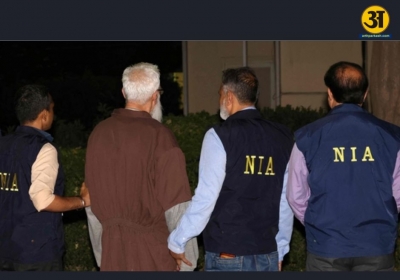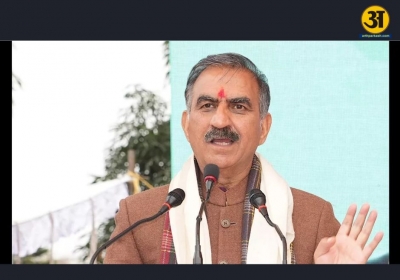
Osama bin Laden’s son visited the country in October for meetings with the Taliban
Osama bin Laden's son visited Afghanistan, held meeting
Foreign terror groups ranging from al-Qaida in the Indian Subcontinent (AQIS) to the Islamic Movement of Uzbekistan (IMU) enjoy more freedom in Afghanistan than in recent years, and Osama bin Laden’s son visited the country in October for meetings with the Taliban, according to a new UN report.
The UN Security Council's latest report on the activities of the Islamic State, al-Qaeda, and their affiliates, released this week, stated that the Taliban have done nothing to limit the activities of foreign terrorists, a claim that will fuel suspicions about the Kabul setup in capitals around the world.
As part of attempts to enforce sanctions imposed on Islamic State and al-Qaeda, the UN's analytical support and sanctions monitoring team produces such reports twice a year. According to the paper, al-Qaeda kept a "strategic silence" after congratulating the Taliban on their win on August 31, last year, ostensibly " not to compromise Taliban efforts to gain international recognition and legitimacy”.
“The security landscape in Afghanistan changed dramatically on 15 August, when the Taliban took control of the country. There are no recent signs that the Taliban has taken steps to limit the activities of foreign terrorist fighters in the country,” as per the report.
“On the contrary, terrorist groups enjoy greater freedom there than at any time in recent history,” it said, adding that UN member states have not reported “significant new movements of foreign terrorist fighters to Afghanistan”.
“recover from a series of leadership losses and is assessed to lack the capability to conduct high-profile attacks overseas, which remains its long-term goal”, Al-Quade continues to say.
The report further concludes, “One Member State reported that Bin Laden’s son, Abdallah (not listed), visited Afghanistan in October for meetings with the Taliban. [Current al-Qaeda chief] Aiman al-Zawahiri was reported alive as recently as January 2021, but Member States continue to believe that he is in poor health.”
In late August, Amin Muhammad ul-Haq Saam Khan, who organized security for murdered al-Qaeda leader Osama Bin Laden, returned to Afghanistan.
Osama Mehmood and his deputy, Atif Yahya Ghouri, lead AQIS. “retains a presence in Afghanistan, in the Provinces of Ghazni, Helmand, Kandahar, Nimruz, Paktika and Zabul, where the group fought alongside the Taliban” against Ashraf Ghani's deposed government.
According to the study, AQIS has between 200 and 400 fighters, mostly from Afghanistan, Bangladesh, India, Myanmar, and Pakistan.
In a disturbing development, UN member states have estimated that the Islamic State-Khorasan Province's strength has increased from 2,200 to over 4,000 fighters, owing to the "release of several thousand prisoners" during the Taliban's rise to power. According to one UN member state, close to half of ISKP is made up of foreign terrorist militants.
“Although the group controls limited territory in eastern Afghanistan, it is capable of conducting high-profile and complex attacks, such as the 27 August bombing at Kabul airport, in which more than 180 people were killed, and several subsequent attacks,” the report says.
ISKP is regarded by the Taliban as their own, “primary kinetic threat, as the group aims to position itself as the chief rejectionist force in Afghanistan, with a wider regional agenda threatening neighbouring Central and South Asian countries”.
The report further adds, “Member States estimated that, if Afghanistan descends into chaos, some Afghan and foreign extremists may shift allegiances to ISIL-K, which continues to be led by Sanaullah Ghafari (alias Shahab alMuhajir), an Afghan national.”
Islamic Jihad Group (IJG), Khatiba Imam al-Bukhari (KIB), and Islamic Movement of Uzbekistan (IMU), all of which actively fought alongside the Taliban in Central Asia, are now "enjoying greater freedom of movement in the country."
Central Asian embassies headquartered in Kabul, according to the report, had “observed with concern that several leaders of those groups have travelled freely to Kabul”. IJG, led by Ilimbek Mamatov, was assessed to be the “most combat-ready Central Asian group in Afghanistan”, It mostly operates in the provinces of Badakhshan, Baghlan, and Kunduz.
The Taliban, on the other hand, have taken steps to contain the anti-China terror group Turkistan Islamic Party (TIP), also known as Eastern Turkistan Islamic Movement, according to the article (ETIM).
“Some Member States reported that, following the Taliban’s return to power,
ETIM/TIP fighters were relocated from their traditional stronghold in Badakhshan
Province, on the border with China, to Baghlan, Takhar and other provinces, as part of the Taliban’s efforts to both protect and restrain the group,”
Says the report. The number of ETIM fighters is estimated to be between 200 and 700, and the group is involved in military training and plotting terrorist strikes against Chinese targets.
“ETIM/TIP members have been encouraged to strengthen their ties to Afghanistan by becoming refugees or Afghan citizens, as a means of more deeply entrenching the group in the country,” the report says.
"ETIM members frequented the Wakhan corridor, calling for a'return to Xinjiang for jihad,'" according to the report. According to the study, the group works closely with al-Qaeda, Tehrik-e Taliban Pakistan, and Jamaat Ansarullah to organize assaults on Chinese interests in Pakistan, Tajikistan, and abroad.
Read more: Meta witnessed the worst stock market





